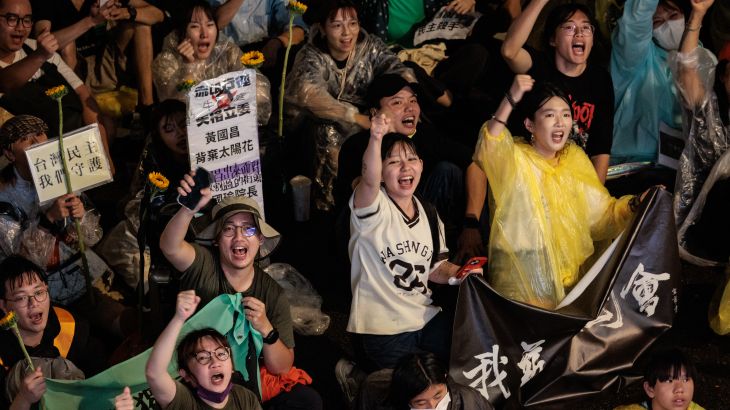EXPLAINER
Why are some Taiwanese afraid of giving legislators more power?
Critics say changes to government oversight laws could pose a national security risk to Taiwan; supporters of reform disagree.
Video Duration 02 minutes 03 seconds 02:03By Erin HalePublished On 25 Oct 202425 Oct 2024
Taiwan’s constitutional court will rule today on whether controversial reforms of government oversight laws are constitutional.
The reforms were passed earlier this year at the legislature in a highly contentious move that led to brawling between legislators – something of a Taiwanese tradition – and the largest mass protests in a decade.
Supporters say the reforms will strengthen parliamentary power; detractors say they are a power grab by the main parties in power and could put Taiwan’s national security at risk.
In a defining moment for Taiwanese politics, the constitutional court will decide today whether the government must keep some or all of the reforms, or even throw them out completely.
Here’s what you should know:
Why are the reforms controversial?
The reforms are controversial because of their content and how they were passed.
The reforms give more powers to the legislature to investigate key issues and prevent scandals or corruption.
Under the current changes, legislators will have the power to demand documents from government agencies, private businesses, organizations and even individuals – including the military – and can impose fines on them if they fail to comply.
Legislators who fail to comply can be held in contempt.
As supporters of the bill, the Kuomintang (KMT) and the Taiwan People’s Party (TPP) say the reforms are necessary for government oversight, while the Democratic Progressive Party (DPP) says it will undermine Taiwan’s separation of powers.
Taiwanese legislators had been discussing varying reforms in committees before, but things sped up when the power in Taiwan’s legislature shifted after the January elections. The results divided the government: Taiwan’s president is from the DPP, but his party narrowly lost their majority in the legislature, which is now headed by the KMT and TPP, who vote together.
The KMT and TPP have worked to push the reforms through the legislature, but the move was later stopped by a temporary injunction.
Why did Taiwanese people protest over the reforms?
Tens of thousands of protesters assembled outside the legislature in Taipei and across other cities because of two main concerns: They said the move by legislators was undemocratic, and they feared the new powers could be used to sell Taiwan out to China, which is the elephant in the room.
Taiwan is a self-ruled democracy that has never been controlled by the Chinese Communist Party, although Beijing has threatened to annex the island state peacefully, or by force if necessary.
People gather in protest outside the parliament in Taipei, Taiwan, in May 2024 [File: Ann Wang/Reuters]
Many Taiwanese, particularly older people from more recent émigré families, still feel a deep cultural or historical connection to China. But sentiments towards Beijing have changed with a rise in Taiwanese nationalism over the past decade.
Amid this shift, the KMT is known for having a better working relationship with Beijing than the “pro-Taiwan” DPP, labelled by Beijing as “separatists”.
Some Taiwanese view the KMT’s stance as an asset, as they can do things like back-channel with Chinese officials. But others fear the KMT is too sympathetic to Beijing, and might even share privileged information, including military secrets.
What do critics say?
Besides fears about leaking information to China, critics worry that expanding the legislature’s powers could be used for politically motivated investigations. Unlike other democracies, Taiwan’s president does not have veto power, so it is already difficult to check the legislature.
Brian Hioe, a frequent Taiwan commentator and founding editor of the Taiwan-focused magazine New Bloom, described the reforms as a “brazen” power grab by the KMT and TPP.
He said the two parties are trying to gain more influence in government, given they only have a small majority in parliament and no real power over the legislature or judiciary.
The KMT is also separately trying to change the voting of the constitutional court from a simple majority to two-thirds.
What do supporters say?
Supporters, particularly from the KMT, say reforms are necessary to check the executive and prevent abuses of power across the government.
The reforms are also seen as part of a broader restructuring of Taiwan’s government, bringing it more in line with other democracies, since it has many holdover institutions from when it was a single-party state prior to 1996.
Supporters of reform say investigative powers could also help root out persistent problems like corruption and conflicts of interest in government, particularly related to issues such as real estate development.
People gather outside the parliament in Taipei, Taiwan, on May 24, 2024 [File: Ann Wang/Reuters]
Some KMT supporters have bristled at the accusations that they are pro-Beijing and would use their expanded power to the detriment of independent Taiwan.
In an op-ed for The Diplomat in May, KMT legislator Wu Tsung-Hsien and KMT Assistant Director of International Affairs Howard Shen dismissed these accusations as “conspiratorial”. They also said it was “crucial” for critics to recognize that Taiwanese politics is about more than just its relationship with China, and it has many other pressing concerns such as consolidating democratic institutions.
